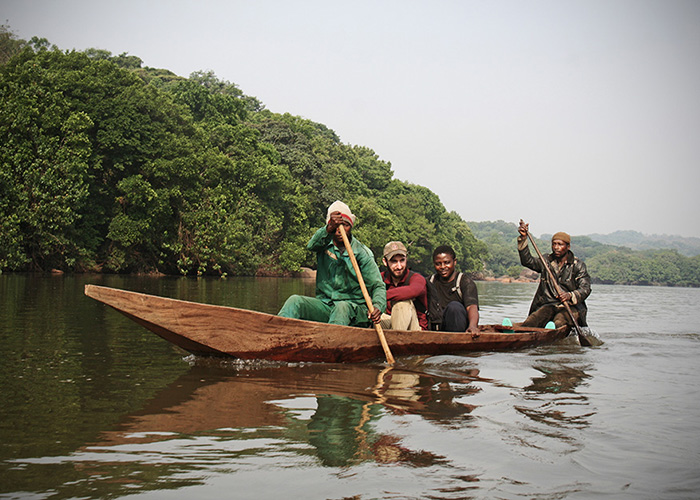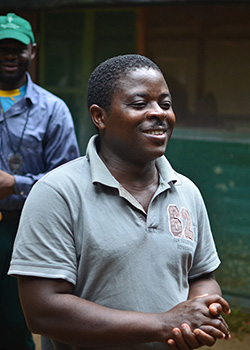Follow My Lead: Ekwoge Abwe, PhD
By Diane E. Holliday
 Photos by Alexandra Ley
Photos by Alexandra Ley
January 24, 2019
PhD Biological Sciences ’18
Manager, Ebo Forest Research Project
Ekwoge Abwe has a gift for rallying others to the cause of conservation. From hunters to farmers to local community members, he has worked for two decades to empower the citizens of Cameroon to protect the country’s fragile ecosystems and its numerous endangered and endemic species. Abwe believes that meaningful leadership — the kind that motivates people to transform their lifestyles in the name of biodiversity — starts at the grassroots. It’s a cause he continued to champion as a doctoral student at Drexel University, and now, as manager of the Ebo Forest Research Project.
It’s been more than 15 years since Ekwoge Abwe, PhD, first stepped foot in West Cameroon’s Ebo Forest, but he can still hear the dense canopies of hardwood evergreens vibrating with the grunts and crows of drill monkeys. He had never seen or heard anything like it before: the colorful birds, rich plant diversity and resident population of 11 primate species.
But the most unforgettable sounds he recalls hearing that day — the day he first witnessed a chimpanzee nest and came face-to-face with a gorilla — are the sounds of gunshots.
Number of Vacation Days I Took Last Year:
0 days
Grants and Awards:
Whitley Fund for Nature Award; Leakey Foundation Grant; Primate Conservation, Inc. Grant; Primate Habitat Country Scholarship from Oxford Brookes University
Reason for Choosing Drexel:
My mentor, Dr. Katy Gonder, who has studied chimpanzees in Cameroon and Nigeria, and made an enormous contribution to the field
“Whenever you hear gunshots, you know it’s a monkey or another species going down in the forest,” Abwe says.
Local and commercial bushmeat hunters are just one of the threats to the Ebo Forest, a biodiversity hotspot that’s three times the size of Philadelphia. Miners, loggers and farmers are also responsible for the endangerment of the numerous species that can only be found in this part of the world.
“There’s a local saying that Cameroon is ‘Africa in miniature’ — it contains every ecoregion on the continent,” he says. “But the sad thing is, local people don’t really value its biodiversity.”
This lack of appreciation stems from a lack of awareness of alternative foods or ways to earn money. Abwe, who grew up in Cameroon, says that for the many people who live close to the forest, bushmeat hunting is all they know. They consume the meat for protein or sell it at nearby markets as their main source of income. It’s a lifestyle that can be traced back multiple generations.
We want them to know they can earn an income and acquire protein from other sources, rather than by killing critically endangered animals.”
So how do you change such a deep-seated tradition?
Abwe and his colleagues at the Ebo Forest Research Project believe that engaging community members in conversations and educating them about alternative, sustainable lifestyles is the only way to make a lasting change.
Hunters, for example, have a wealth of knowledge about native plants and primates — often teaching researchers about animal behaviors, including habitat occupation and dietary patterns. By educating them about the importance of the local ecosystem and species, Abwe has been able to open their eyes to the impact their actions have on the environment. In return, he has applied their knowledge to the scientific world, even offering some of the hunters positions as field assistants at the EFRP’s field stations.
 Photo by David Montgomery
Photo by David Montgomery
“We need to empower these communities to earn a living through other, more sustainable lifestyles,” says Abwe. “For instance, if they need capacity in animal husbandry or developing fish ponds, we bring in an expert to teach them how to do that. We’ve also supplied seeds, including high-yielding cocoa beans, for farming. We want them to know they can earn an income and acquire protein from other sources, rather than by killing critically endangered animals.”
The EFRP also spearheads citizen-science initiatives like the Clubs des Amis des Gorilles, or Gorilla Guardians, which empowers community members to monitor gorilla habitats, map their ranging patterns, and take measures to prevent threats to their safety. With an estimated population of only 25 Ebo gorillas — a possible new subspecies of western gorilla — inhabiting the northeastern part of the forest, it’s critical that all stakeholders play a part in conservation efforts.
The Gorilla Guardians are working to create a “no-go” zone in the forest, which will restrict access to the 25-square-kilometer region where the gorillas can be found. They also plan to present a memorandum of understanding to engage a wide range of stakeholders, including local and traditional authorities, for the successful implementation of the project.
Since the creation of the Gorilla Guardians in 2012, there have been no known killings of gorillas, chimpanzees or elephants in the monitored area.
“What sets Ekwoge apart from other conservation activists is his uncanny ability to rally local leaders to this cause,” says Katy Gonder, PhD, associate professor of biology at Drexel and Abwe’s PhD adviser.
For more than 10 years, Abwe has worked tirelessly with local officials and traditional leaders to classify the Ebo Forest as a national park. If reclassified, the park will be eligible for much-needed government funding and resources to further protect the forest’s biodiversity.
Abwe’s numerous appeals to local officials were finally heard in 2013, when the leaders agreed to petition the national government to finalize the protection of the forest. Although the government has yet to do so, Abwe remains optimistic and committed to his cause.
“Change doesn’t happen overnight. It takes time to change attitudes and ways of living, but we’re getting there,” he says.
Abwe will continue his conservation work in Cameroon as a postdoc with San Diego Zoo Global’s Central Africa Program starting in January 2019, extending his research to new areas of the country, and continuing to be a champion for the environment.
“The present generation has a responsibility to future generations to take care of what we have,” says Abwe, the father of five young boys. “If we do not, we are destined to break our generational chain.”
* This article originally appeared in the College of Arts and Sciences' Ask magazine feature story, “Follow my Lead.” For more Ask stories, visit askmagazine.org.